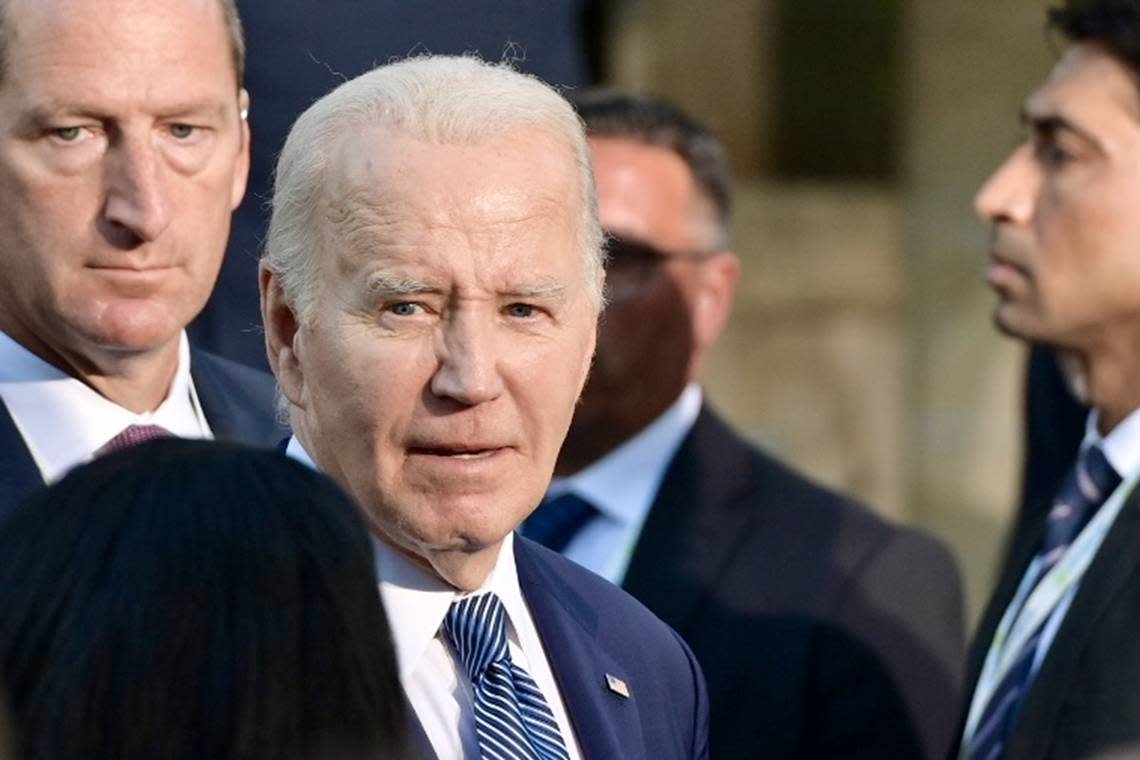Undocumented spouses of U.S. citizens will be able to apply for green cards in new policy

Hundreds of thousands of undocumented people who are married to U.S. citizens and have lived here for a long time will now be able to apply for green cards without having to leave the United States.
On Tuesday, the Biden administration will announce a new program that will allow an estimated 500,000 undocumented spouses and 50,000 of their children under the age of 21, to request lawful permanent residency without having their cases processed abroad. The new process could put many of them on a path for U.S. citizenship in a few years.
“These measures will help keep American families together,” a senior Biden official said.
The policy will offer long-awaited relief for many families, including many in Florida. It’s hard to quantify how many mixed-status families in the state will benefit from Tuesday’s announcement for U.S. spouses, but available data shows the impact could be widespread.
The Florida Policy Institute, an independent research group, estimates that about 130,000 undocumented people are married to American citizens in Florida. Meanwhile, the American Immigration Council has estimated that nearly 600,000 U.S. citizens in Florida live with at least one undocumented family member, including 8% of the state’s U.S. citizen children.
Contrary to popular belief, marriage to a U.S. citizen is not a surefire path to lawful permanent residency or citizenship for undocumented immigrants. As part of the application process for a green card, many of those people are required to leave the United States. But being able to come back is not a guarantee, or it can mean people having to wait for long periods of time for bureaucratic visa processes to resolve. Many do not want to risk being separated from their American spouses and children and opt to continue living undocumented instead.
“Many noncitizens must first depart the United States and wait to be processed abroad, resulting in a prolonged, potentially indefinite, period of separation from their U.S. citizen family members and causing tremendous hardship,” a senior administration official said.
To be eligible for the new process, the undocumented spouses must have been in the United States a decade or more as of June 17, not pose a threat to public safety or national security, and otherwise be eligible to adjust their status. Biden officials did not indicate when the administration would publish more details around eligibility and the application status, though they did say it would occur in the “near term.” On average, the individuals have lived here for 23 years, but have been unable to establish a legal immigration status.
“We celebrate alongside millions whose futures are brighter today, stand with those still awaiting similar protections, and renew our commitment to protecting this progress and fixing every aspect of our failed immigration system — including giving a pathway to citizenship to those who have waited too long,” said Todd Schulte, president of immigration reform advocacy group FWD.us, in a statement.
The Biden administration also announced that it would make it easier and quicker for undocumented college graduates and recipients of the Deferred Action for Childhood Arrivals, or DACA — which grants deportation protection and work authorizations to young people who came to the U.S. as children — to get temporary worker visas through job offers after getting higher-education degrees. The Obama-era DACA celebrated its 12-year anniversary on Saturday. It currently has over 528,000 recipients, according to federal government data, including over 20,000 in Florida. The program, which was established while Biden was vice president, has been heavily litigated in the courts. Former President Donald Trump tried to cancel it altogether during his administration, though the U.S. Supreme Court did not allow it because the termination did not follow the proper administrative protocols.
The new Biden policies come nearly two weeks after the administration announced that it would generally ban immigrants who cross the U.S.-Mexico border unlawfully from receiving asylum after immigration authorities register a certain average of daily encounters each week. It also comes as immigration continues to be a cornerstone of the 2024 presidential race between Biden and Trump.
The recent asylum policy has been widely criticized by immigration advocates and experts, who say that the restrictions violate international and U.S. law, will not be possible to carry out under the already underfunded and overburdened system, and will keep people with legitimate asylum claims from receiving protections they are entitled to.
Tuesday’s announcements are also part of a wider package of immigration policies that President Biden has taken through executive action, including a parole program for Cuba, Haiti, Nicaragua, and Venezuela that allows people from those countries to come to the U.S. for a two-year period as long as they pass health and background checks.
Several presidents have used their executive authority to extend immigration paroles, including to bring refugees from Vietnam, Hungary, Cambodia, Laos, and the Soviet Union. Republicans have heavily criticized Biden’s use of parole on immigration issues, while Biden administration officials have said the president has been forced to do given congressional inaction on immigration reform.
“Paired together, these actions will advance our country’s interests while ensuring anyone known to pose a threat to public safety cannot take part in our immigration system,” a senior administration official said. “Still, only Congress can achieve the enduring immigration reform that our country has needed for nearly 30 years.


